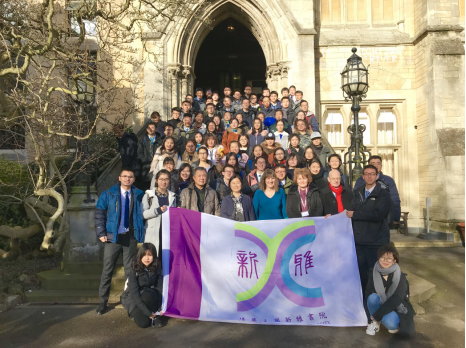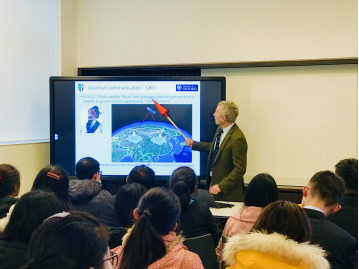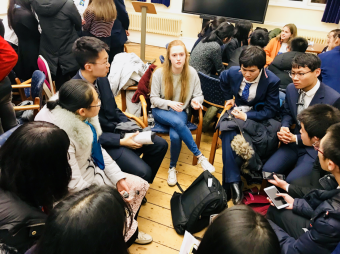In January 23-27, 2018, a group of young Tsinghua students visited the University of Oxford from college to college to develop an idea of and find an echo on how to think of universities, colleges, humanities, sciences, and arts. For either the Tsinghua University or the University of Oxford, it may be pioneering.

When it comes to the successful visit, thanks must be due to the Office of International Education and the Office of International Affairs at the Tsinghua University, and some Tsinghua alumni studying at Oxford for their positive support.
To gain deeper insights into the educational traditions and the collegiate system of Oxford as one of the world's leading universities, and develop and train Xinya students' observation and understanding ability and global competence, a freshmen delegation from Xinya College, "Way of University", paid a five-day academic visit, entitled "Collegiate Education and Life in the 21st Century", to the University of Oxford. Led by teachers on humanities, arts, and sciences including Cao Li, Li Mu, Gu Xueyong, and Gao Jin, the delegation consisted of more than 60 students. In addition to the focus on the collegiate system and the tutorial system, sciences, humanities, arts and other subjects at Oxford were also covered. During the visit, diverse thematic symposiums and discussions were organized for Tsinghua students, which not only helped them build a multifaceted and multi-level understanding of Oxford's educational traditions and features but also enhanced their abilities in multi-civilization, multi-cultural, and multi-disciplinary understanding and exchange. Despite a brief journey for only five days, this visit to one of the world's leading universities consisting of world-class colleges was fruitful and rewarding as expected.
Tutorial system: A dazzling gem on the crown of the University of Oxford
The first stop of the visit was New College. Though its name, "Xin Xue Yuan" in Chinese, also includes the Chinese character of "Xin" (新, meaning "new" in English) as Xinya College, New College, established in 1379, enjoys a long history of more than 600 years. On January 23, Miles Young, Warden of New College, David Palfreyman, Bursar of New College, Director of the Oxford Centre for Higher Education Policy Studies (OxCHEPS) and author ofThe Oxford Tutorial, andMark Curtis, Director of Development at New College, shared the schooling concepts and educational systems of the University of Oxford and New College — which was the focus of the visit — with the delegation around the topics of "Opportunities and Challenges in the Digital Era", "Tutorial System", and "University of Oxford" respectively. In the view of the warden and his colleagues, how "high" the higher education of the University of Oxfordcan be largely depends on the tutorial system."In the past centuries, holding small or even one-on-one symposiums between tutors and students on a regular basis has been praised as a dazzling gem on the crown of the University of Oxford."
In the UK's higher education system, general education is not included in undergraduate education as it is basically completed during the high school stage. But the principles and approaches of general education are naturally followed when tutors and students have close interactions under the tutorial system, one of Oxford's proudest assets rooted in the principles of liberal education. Through text reading, independent thinking, profuse writing, and regular face-to-face symposiums between tutors and students, students' inquisitive mind, research potential and especially analytic thinking, critical thinking, value judgement and other abilities of paramount importance for lifelong learning can be developed and trained to the greatest extent.Because of this, Oxford students were confident and can think outside the box during group discussions, which impressed Tsinghua students very much.Li Shihao, a student of the delegation, said, "Nearly all the students we met at Oxford are hardly aware of where they will go and what they will do after graduation. But they don't care at all. What's in their mind is to complete the undergraduate program in earnest, so they can study the courses without any predetermined purpose. This really makes me admire."
When it comes to the virtues of the collegiate system and the tutorial system, another Tsinghua student Zhang Zixuan said, "Under the collegiate system, a teacher not only works in a faculty or a department, but also works in a college to tutor its students. In this way, teachers and students can form an organic community. As students and teachers all live on campus, it is easy for them to communicate (For example, students can directly knock at the door of their professors' rooms when facing problems they want to discuss with them). Meanwhile, the collegiate system is not to draw a line among colleges, so a tutor from a college can still tutor students from another college. As far as I'm concerned, it is putting academics first and basing academic research on self-driven students that make 'higher education' what it is."
People have to abandon "common sense" to get close to truth.
On January 24, the delegation visited the second stop,St Peter's College, to attend the thematic lecture titled "Quantum Technology: Clocks, Cryptography and Computers" given by Christopher Foot, Professor of Physics at the college.Guided by Prof. Foot, Gu Xueyong and other teachers, and several doctoral students, Tsinghua students had an in-depth discussion on the application of quantum technology in clocks, computer programming, and cryptography, and the exploratory prospects for the application of quantum mechanics in the frontier fields.

Student Chen Zonghao said after the lecture and the discussion, "The one on quantum mechanics may be the most challenging among the several lectures. In such a theoretical system that is contrary to intuition, we have to abandon 'common sense' to get close to truth.
Maybe it is the decisive role of critical thinking in natural science. Before the lecture, what we knew about the quantum mechanics was probably only Schrödinger's cat theory; after it, we were introduced to a brand-new quantum world by Prof. Foot. From the perspective of technological progress, quantum mechanics has brought about seminal breakthroughs in communications, which can be seen from the quantum computer with greatly enhanced running ability. Therefore, quantum mechanics will lead humankind towards the most micro world. But quantum mechanics lacks 'beauty' of physics, and has a number of flaws compared with classical physical theories. That's because its five fundamental postulates rely more on mathematical deductions rather than intuitive physical models." Student Li Shihao said what he learned about physics from a deeper level, "As a discipline of natural science, physics is absolute on the one hand and pluralistic on the other hand, involving computing, reasoning, and thinking. No wonder Oxford has opened many such courses as "Physics and Philosophy" and "Computer Science and Philosophy" —Only when one thinks in a great way, can a great theory be created."
Sailing to Byzantium:Life has its end, but soul and poetry don't
A great university cannot be without science or literature and poetry. On January 25, the delegation visited Balliol College which is hailed as the birthplace of PPE (philosophy, politics and economics) interdisciplinary major, and watched the tutorial course video and some lecture episodes of the college's literature courses. In this way, Tsinghua students developed an understanding of how Oxford students attending tutorial courses become inquisitive, expressive, and self-driven with their tutors' encouragement and tutoring.
Cardinal John Henry Newman, author ofThe Idea of a University in the 19th century, ever said that if a university cannot make young students inquisitive for poetry or human issues, then there is no doubt that it lacks appeal.In order to make the visiting students have first-hand experience of the unique role of literature teaching in undergraduate education, Nicola Trott, Academic Registrar for Graduates at Balliol College, gave a critical appreciation ofSailing to Byzantium, a famous poem by well-known Irish poet and also Nobel Prize in Literature winner W. B. Yeats.During the unforgettable experience, the students, guided by both Oxford and Tsinghua teachers, had a close reading and a heated discussion about the poem's motif, rhythm, and image. Especially its strong philosophical sense about nature, arts, and circles of life as well as consummate and unique rhythm let the students' imagination run wild. Some students talked about salmon's anadromous life cycle from the biological perspective, and the others compared the expression techniques of Eastern and Western landscape poetry or introduced the symbolic meaning of Byzantium from the perspective of the crossroads of Eastern and Western civilizations. Every question they raised and every answer they gave have demonstrated their critical thinking ability developed through general education.
Group discussion with Oxford students: the biggest highlight of the visit
In the eyes of Pan Yeliang and other Tsinghua students, "This visit to Oxford is short but interesting and rewarding like never before." With the instruction of the leading teachers and the help of local alumni, they also organized group activities in addition to collective activities. For example, they made lesson preparation, grouped themselves, and visited Oxford's Mansfield College, Pembroke College, Lady Margaret Hall, Regent's Park College, and Christ Church.

When having close exchanges and discussions with Oxford teachers and students, Tsinghua student Shen Yingsha observed two different ways of seeing things: "Humanities adopt a holistic approach and then an individual approach, while sciences adopt an individual approach and then a holistic approach". In the eyes of another Tsinghua student Yin Letian, "Oxford courses are neither a strong advocate of the principles of general education nor put a high premium on occupational orientation. But secondary education and 'transferable skills' training ensure that Oxford students are qualified for their jobs after they enter the workforce." Tsinghua student Yu Shuyang said, "The difference between Oxford and Tsinghua in educational model comes as a result of not only different cultures of China and the UK, but also different development situations of Southeast Asia and Northwest Europe in population, economy, politics, and society."
On January 26, Dr. Wang Shidong, Director of the Oxford Prospects and Global Development Institute at the Regent's Park College, gave an introduction to the organizational relations between the University of Oxford and its colleges. This has made Tsinghua students know more deeply that faculties/departments and colleges as well as research and teaching are mutually linked and complementary. Through Dr. Wang's introduction, Student Jin Xuyang realized, " Departments and colleges as two independent while interlinked systems of Oxford are a vivid reflection of its academics-focused approach andtime-honored educational traditions."Student Wen Jin said similarly, "As the University of Oxford and Oxford City look to changes, some unique cultural genes and well-established educational models that encourage conditioning, feedback, and discussion have been held onto, which provides valuable food for thought to develop our college and college model from new things to classics." Student Pan Yu'ang thought the most valuable thing he learned from the visit is how the University of Oxford sees tradition. "This visit is only a starting point. As universities develop, thinking about how to solve the contradiction between tradition and innovation will remain."
To appreciate a work of arts, you should consider more what's on your rather than an artist's mind.
Artistic aesthetics and museum experience are integral parts of Xinya College's general education. Led by Li Mu, Gao Jin, and other teachers, Tsinghua students went on an educational tour of the University of Oxford' Bodleian Libraries, Ashmolean Museum, Museum of Natural History, and History of Science Museum, as well as the Museum of Oxford. Those treasures in humanities, sciences, arts, and nature gave them an electrifying aesthetic experience visually, and also inspired them to think history, society, and culture from a pluralist perspective.
Moreover, the students found that art is an important and commonplace thing at the University of Oxford and all over the country. It is everywhere like air and sunshine, from teaching buildings, libraries, canteens and bars at Oxford to town halls and metro stations across the country. Student Hu Jiale said, "Maybe there is a story and a history behind every object. It may be a reflection of a glorious civilization with elegant arts, and also may be an epitome of how a civilization declined and was robbed savagely. It lets our imagination run wild and gives us an itch to explore."
In the twinkling of an eye, the five-day visit came to an end. For all the students of Xinya College's delegation, multicultural and interdisciplinary exchanges between Tsinghua and Oxford teachers and students, unique insights and consensuses of the two sides on first-rate universities and colleges, as well as the efforts of the University of Oxford and Oxford City to stick to tradition while embracing modernity are impressive memories.